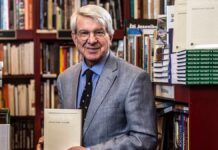Matthew Arnold was a writer of many activities, but it is chiefly as a poet and a critic that he now holds his place in English literature. The Scholar-Gypsy is a lyrical poem by Arnold, published in 1853. The poem is based on a legend from Joseph Glanvill’s book The Vanity of Dogmatizing (1661), which tells the story of an Oxford student who abandons academic life to join a group of gypsies and learn their ways. Arnold uses this legend as a framework to explore themes of alienation, disillusionment with modern life, and the search for deeper meaning.
The poem opens with a serene description of the English countryside, evoking a pastoral scene where the poet reflects on the peaceful, unchanging nature of the landscape. The speaker imagines the scholar wandering through these same fields, free from the burdens of society. He envies the scholar’s detachment from the industrial and intellectual chaos of modern life.
Throughout the poem, Arnold contrasts the timeless existence of the scholar-gypsy with the hectic, fragmented lives of modern individuals. The scholar’s quest for knowledge is portrayed as a spiritual journey, one that transcends the materialistic and mechanical aspects of contemporary society. While modern people are restless and dissatisfied, the scholar-gypsy is depicted as having a singular focus, living in harmony with nature, and pursuing a more profound, almost mystical understanding of life.
Arnold presents the scholar as an eternal figure, untouched by time and immune to the disappointments that plague modern life. The scholar’s decision to abandon the confines of academia in favour of a more authentic, gypsy-like existence is depicted as an act of rebellion against the intellectual rigidity and spiritual deadness of modernity.
In the later stanzas, the poet urges the scholar-gypsy to avoid contact with modern life, warning that its “disease” of mental and emotional exhaustion could corrupt his purity. Arnold’s portrayal of modern life as diseased reflects his deep sense of alienation and critique of the industrial and intellectual conditions of his time. The poem concludes with the scholar remaining a distant, elusive figure, forever seeking truth outside the boundaries of conventional society.
Summary
The speaker of The Scholar-Gypsy describes a beautiful rural setting in the pastures, with the town of Oxford lying in the distance. He watches the shepherd and reapers working amongst the field and then tells the shepherd that he will remain out there until sundown, enjoying the scenery and studying the towers of Oxford. All the while, he will keep his book beside him.
His book tells the famous story by Joseph Glanvill, about an impoverished Oxford student who leaves his studies to join a band of gypsies. Once he was immersed in their community, he learned the secrets of their trade.
After a while, two of the scholar-gypsy’s Oxford associates found him, and he told them about the traditional gypsy style of learning, which emphasises powerful imagination. He planned to remain with the gypsies until he learned everything he could and then to tell their secrets to the world.
Regularly interjecting his wonder into the telling, the speaker continues the scholar-gypsy’s story. Every once in a while, people would claim to have seen him in the Berkshire moors. The speaker imagines him as a shadowy figure waiting for the “spark from heaven,” just like everyone else on Earth. The speaker even claims to have seen the scholar-gypsy himself once, even though it has been over two hundred years since his story first resonated through the halls of Oxford.
Despite that length of time, the speaker does not believe the scholar-gypsy could have died since he had renounced the life of mortal man, including those things that wear men out to death: “repeated shocks, again, again/exhaust the energy of strongest souls.” Having chosen to repudiate this style of life, the scholar-gypsy does not suffer from such “shocks” but instead is “free from the sick fatigue, the languid doubt.” He has escaped the perils of modern life, slowly creeping up and destroying men like a “strange disease.”
The speaker finishes by imploring that the scholar-gypsy avoid everyone who suffers from this “disease,” lest he become infected as well.
Analysis
Though this poem explores one of Arnold’s signature themes – the depressing monotony and toil of modern life – it is unique in that it works through a narrative. There are two levels of storytelling at work in the poem: that of the scholar-gypsy, and that of the speaker who is grappling with the ideas poised by that singular figure.
Both story levels relay the same message: the scholar-gypsy has transcended life by escaping modern life. As he usually does, Arnold criticises modern life as wearing down even the strongest men. His choice of the word “disease” is telling since it implies that this lifestyle is contagious. Even those who try to avoid modern life will eventually become infected.
In this way, the poem comments on the perils of conformity, as other poems in this collection do. What makes the scholar-gypsy so powerful is not only that he wishes to avoid modern life -many want to do that. More importantly, he is willing to repudiate normal society for the sake of his transcendence entirely. There is a slightly pessimistic worldview implicit in that idea since it is impossible to revel in true individuality and still be a part of society. The scholar-gypsy has had to turn his back entirely on Oxford, which represents learning and modernity here, to become this great figure. Yet, the poem is much more optimistic than many of Arnold’s works because it suggests that we can transcend if we are willing to pay that cost. This makes it different from a poem like “A Summer Night,” which explores the same theme but laments the cost of separation that individuality requires.
For all his admiration, the speaker has not yet mustered the strength to repudiate the world. The setting helps establish his contradictory feelings. The poem begins with images of peaceful, serene rural life, a place where men act as they always have. They have been untouched by the perils of modernity. Pastoral imagery has always been associated in poetry with innocence and purity, unfiltered humanity in touch with nature. The speaker is out in the field contemplating this type of life and the possibility of acting as the scholar-gypsy did.
And yet he is also studying the towers of Oxford, which represents the rapidly changing, strictly structured world that the scholar-gypsy renounced. Arnold deftly expresses the speaker’s split priorities through this juxtaposition. At the same time that he admires the scholar-gypsy, he cannot fully turn his back on the modern world. It is the same contradiction that plagues the speaker of “A Summer Night.”
Thus, the poem represents Arnold’s inner conflict, desire to live a transcendent life, and inability to eschew society. At this point in his life, Arnold felt pulled in different directions by the world’s demands. He was trying to resist the infection of modernisation, but it was creeping up on him nevertheless, and the pressure to conform was negatively affecting his poetry. Undoubtedly, Arnold wished he could escape in the way the scholar-gypsy did; however, he was too tied down by responsibilities to ever dream of doing so.
Themes and Ideas
The Scholar-Gypsy revolves around themes of escapism, alienation, the search for meaning, and the critique of modernity. Arnold contrasts the peaceful, pastoral life of the scholar with the chaotic, fragmented experience of modern life, exploring the tension between the desire for deeper spiritual knowledge and the distractions of contemporary society. The poem also delves into existential themes, presenting the scholar as someone in search of a higher truth, far removed from the mechanised, intellectual pursuits of the modern world.
Pastoral Imagery
Arnold employs rich pastoral imagery to create a sense of serenity and timelessness. The English countryside, with its tranquil fields and meadows, serves as a metaphor for the scholar’s peaceful, untroubled existence. This idyllic setting highlights the contrast between the natural world, which remains constant and harmonious, and the artificial, industrialised world of modernity, which Arnold perceives as chaotic and disillusioning. The pastoral landscape becomes a refuge from the pressures of society and intellectual life, mirroring the scholar’s desire to escape the philosophical constraints of academia.
The Scholar as a Symbol
The scholar-gypsy is a symbolic figure representing the quest for a higher, more authentic form of knowledge. He rejects the formal education system in favour of a nomadic, mystical existence, which Arnold portrays as an ideal. The scholar’s journey is not just a physical escape but a spiritual one, symbolising the desire to break free from societal expectations and the intellectual conformity of modern life. His ability to live outside of time and societal pressure makes him an almost mythic figure, untouched by the emotional and mental exhaustion that defines the lives of modern people.
Critique of Modern Life
A central theme in The Scholar-Gypsy is Arnold’s critique of modern life, which he sees as fragmented, restless, and spiritually bankrupt. He uses the scholar’s escape from academia as a metaphor for the individual’s struggle to find meaning in a world dominated by industrialisation, intellectual dogma, and materialism. Arnold’s portrayal of modernity as a “disease” suggests that modern life drains individuals of their creativity and spiritual vitality, leaving them in perpetual dissatisfaction.
Tone and Mood
The tone of the poem is contemplative, melancholic, and at times nostalgic. Arnold’s speaker reflects on the unchanging beauty of the countryside and contrasts it with the frenetic pace of modern life. This creates a mood of yearning for simplicity and escape, as the poet longs to join the scholar-gypsy in his timeless quest for knowledge. The tone becomes more urgent in the later stanzas as the poet warns the scholar to stay away from the “disease” of modern life, reinforcing the sense of isolation and alienation that pervades the poem.
Structure and Form
The Scholar-Gypsy is written in ten-line stanzas of iambic pentameter, adhering to a strict rhyme scheme ABABCDDEEC. The regularity of the form reflects the poem’s meditative tone and reinforces the sense of timelessness that Arnold is trying to convey. The poem is long and unfolds slowly, mirroring the scholar’s patient quest for knowledge and the unhurried pace of the natural world. This structured form contrasts with the fragmented, disordered experience of modern life, further emphasising the divide between the scholar’s peaceful existence and the chaos of modernity.
Use of Language and Symbolism
Arnold’s language is rich in imagery and symbolism, drawing heavily on natural and pastoral motifs to convey the theme of escape. The countryside symbolises purity, peace, and timelessness, while the city and modern life represent corruption and disillusionment. The scholar-gypsy himself is a powerful symbol of intellectual freedom, spiritual purity, and the search for meaning. Arnold’s symbolic language elevates the poem to a philosophical meditation on the nature of life, knowledge, and modernity.
Philosophical Undertones
At its core, The Scholar-Gypsy grapples with existential questions about the purpose of life and the pursuit of knowledge. Arnold’s depiction of the scholar as someone who seeks a higher truth beyond the confines of academia reflects the poet’s philosophical concerns with the limitations of institutionalised learning. The scholar’s journey is presented as a spiritual quest, raising questions about the nature of knowledge, the role of the individual in society, and the possibility of escaping the alienating effects of modernity.
In The Scholar-Gypsy, Matthew Arnold creates a powerful contrast between the peaceful, timeless existence of the scholar-gypsy and the fragmented, disillusioned lives of modern individuals. Through rich pastoral imagery, symbolic characters, and a contemplative tone, Arnold critiques the alienation and spiritual emptiness of modern life while celebrating the pursuit of deeper, more meaningful knowledge. The poem remains a poignant reflection on the human condition and the quest for authenticity in an increasingly complex and industrialised world.




























